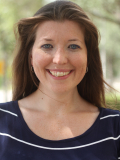|

Anastasia Khawaja
University of South Florida, Tampa, Florida, USA
|
|

Riah Werner
National Pedagogical Institute for Technical and Professional Training, Abidjan, Cote d’Ivoire
| Hello SRIS,
It has been a challenge to find the words to write over the
past few weeks as advocates and activists are faced with seemingly
insurmountable tasks as the headlines unfold every day, multiple times a
day. However, just as our academic session at the TESOL convention
closed with advice from Fred Rogers of Mr. Rogers’ Neighborhood, this
post convention newsletter opens with it. He said, “When I was a boy and
I would see scary things in the news, my mother would say to me, ‘Look
for the helpers. You will always find people who are helping.’”
These words have become a kind of a daily mantra for us to live
by during these fraught times. There are entirely too many
heartbreaking stories to list. We have all seen the news. These
continuously unfolding events bring opportunities for more protests,
more marches, and more advocacy for so many groups of people. In this
newsletter, we are proud to bring you helpers whose work exhibit hope,
inclusivity, and a call to get involved and come together. In this
issue, we continue conversations started at the convention. We highlight
not only the work of this interest section, but also we underscore the
crucial value many of the social justice related professional learning
networks bring to the TESOL organization as well. As always our authors’
perspectives are their own, and our newsletter should be taken as a
forum for our membership to share their views about issues that are
important to them, which may or may not reflect the opinions or official
positions of TESOL International Association.
In contrast to the divisiveness that has become so prevalent in the
news, the SRIS newsletter focuses on the ways we can create inclusive
educational spaces and advocate for solidarity within our professional
communities. This issue begins with Riah Werner’s Black Spaces
and White Norms: The Importance of BELPaF for the TESOL
Community, a reflection on the history of the Black English
Language Professionals and Friends Professional Learning Network and the
importance of maintaining supportive spaces for underrepresented groups
within TESOL. Shifting to focus on classroom experiences, James D.
Mitchell draws connections between his research and his life experiences
in order to highlight the necessity of inclusive classroom spaces for
the success of LGBTQ+ language learners in Invalidated Identity
and Foreign Language Anxiety: A Personal Reflection. Focusing
on how administrative decisions can affect students, Jennifer Burr’s Social Intelligence Course Implementation for English Learners describes how a school district in Texas designed a course to
help newcomer students develop the social and emotional skills they need
to be successful in their new environment. Next, in The
Neighbor’s Window: A Visual World Foundation Project on Bystanders
Becoming Upstanders, Zsuzsanna Kozák and Ildikó Lázár outline
classroom activities from a project they conducted in Hungary, which
used images from the Holocaust to help students counter the bystander
effect and learn to speak up in the face of injustice.
We conclude this issue with Cinthya Salazar’s thoughtful review
of Teachers as Allies: Transformative Practices for Teaching
DREAMers and Undocumented Students, edited by Shelley Wong,
Elaisa Sánchez Gosnell, Anne Marie Foerster Luu, and Lori Dodson, the
first selection for SRIS’s book club. Salazar highlights the urgent
needs for resources to help teachers and administrators working with
undocumented students in the US, and outlines the ways this book fills
that gap, drawing particular attention to the way students’ own voices
are incorporated into the book. We hope you will join us in reading Teachers as Allies, and participate in online
discussions with the editors and other members of the SRIS community
throughout August and September. Please check our Facebook
page for more information and to share your thoughts about the
book.
As our communities continue to be impacted by the continuous
barrage of breaking news day in and day out, how do we continue to deal
with this? How can we be reminded we are not alone in the fight? Don’t
worry SRIS! We have your back;). Our next issue is about allyship! This
issue will be dedicated to discussing the responsibility we hold to be
allies, as well as advice about self care. Please see the call for submissions and consider contributing
to another timely, crucial issue for our interest section and for TESOL.
Just as this letter opened with a quote of hope, allow us to end with
the words of the great John Lewis, civil rights icon, American hero, and
the United States Congressman representing Atlanta, the site of next
year’s TESOL convention. There is truly nobody better to look to during
this trying time. Representative Lewis has tweeted several times,
encouraging everyone to get out and take action, following his tweets
with the hashtag #goodtrouble. “Do
not get lost in a sea of despair. Be hopeful, be optimistic. Our
struggle is not the struggle of a day, a week, a month, or a year, it is
the struggle of a lifetime. Never, ever be afraid to make some noise
and get in good trouble, necessary trouble.” Well SRIS, let’s
make good trouble! Continue to fight, continue to advocate, and
remember, we are all in this together.
Sincerely,
Anastasia and Riah
Anastasia Khawaja has been in the TESOL teaching
profession for 11 years. She is a doctoral candidate in second language
acquisition/instructional technology at the University of South Florida.
Her dissertation research focuses on the emotions associated with
languages that Palestinians use in Palestine and in the diaspora. She
currently holds the position of senior instructor at INTO University of
South Florida and has international teaching experience in Peru, South
Korea, and the United Arab Emirates.
Riah Werner is an English teacher and teacher trainer
who has taught in Africa, Asia and South America. She is currently an
English Language Fellow based in Abidjan, Cote d’Ivoire, where she has
designed a national continuing professional development project for
in-service teachers. Her research interests include drama and the arts,
social justice in ELT, and locally contextualized pedagogy. She
documents her projects and blogs about the articles she reads
at riahwerner.com. |

